The closing event took place in the Muranów Cinema in Warzaw with guests and speakers from both the Civil Society Organisations in Poland and representatives from the donor countries.
The programme is funded by Iceland, Liechtenstein and Norway through the EEA and Norway Grants, and with the budget of close to €34,000, the funded projects, 501 in total, have worked towards:
- Increased citizen participation in civic activities
- Increased support for human rights and antidiscrimination practices
- Increased empowerment of vulnerable groups
- Enhanced capacity and sustainability of civil society organisations and the sector
The Operator of the Active Citizens Fund - National is a consortium of three organisations, the Stefan Batory Foundation (leader), the Shipyard Foundation, and the Academy of Civic Organizations Foundation.
Lead by the consortium, 589 Civil Society Organisations have implemented the 501 projects under the Grants, and nearly 430,000 people have participated in activities carried out thanks to the programme.

©️ Aktywni Obywatele Fundacja Batory Anna Liminowicz
“The ACF-National program proved to be a great support for civil society organisations in difficult times of pandemic, war and threats to the functioning of democracy in Poland. Many human rights organisations, whose activities were particularly needed at the time, did not have access to public funds. Our program gave them a chance to operate uninterruptedly and, thanks to organisational grants, to think strategically about their own development and financial independence, but also about their advocacy activities. In many areas, thanks to the friendly procedures and substantive support of the Program, organizations were able to implement pilot projects that, for example, changed the functioning of groups at risk of exclusion - such as self-advocacy or respite tourism.”
Sylwia Sobiepan, Director of the ACF-National
Civil society In Poland has been extraordinarily active over the last years and has worked relentlessly to protect and promote democracy and the rule of law. Diversity in ways and means of engagement is a key feature of civil society, but ultimately this is how we defend our common basic values. Defending civic space. Ingrid Schulerud, Special Representative on Democracy and Rule of Law, Norwegian Ministry of Foreign Affairs
Bilateral and international cooperation
51 of the projects were implemented in cooperation with partners from the Donor States; 33 with Partners from Norway, 13 with partners from Iceland, 3 with partners and from Iceland and Norway, 1 with a partner from Iceland and Bulgaria, 1 with a partner from Liechtenstein and 1 with a partner from Ukraine.
As part of the programme, 75 international events were organised, (including study visits) for the grantees, and more than 2,000 people from over 1,000 Civil Society Organisations participated in international activities.
And the programme supported 27 bilateral and regional initiatives organised by the Project Promoters, aimed at establishing and deepening international cooperation.

©️ Aktywni Obywatele Fundacja Batory Anna Liminowicz
“In our programme, we also support mutual learning and understanding between Polish civil society organisations and their counterparts from the Donor and Beneficiary States. In the film “Little big things” we show a visit to the island of Utoya, through which Polish CSOs involved in dialogue, deradicalization and commemoration were able to learn about the methodology of the Utoya Learning Center's work, as well as to understand better Norwegian society before and after July 22, 2011. The film also shows our Lithuanian-Latvian-Polish initiative about the humanitarian crisis on the border with Belarus. Through screenings of the theatre performance by our Project Promoter, StrefaWolnosłowa, we are sensitizing local communities to the plight of people on the move, those seeking asylum, and those providing humanitarian aid.”
Anna Fedas, ACF-National bilateral and regional cooperation manager
The project promoters who have participated in this programme the last five years, give powerful testemonies to the value of the programme.
“We got the first participants in the Sharing a passion for mountains project, we joke, from a ‘round-up’. We approached people on the street and suggested <<listen, we have a project, come with us to the mountains>>. They couldn’t believe it was possible. Respite tourism is a term that was developed during the creation of the network, we were looking for a name to describe what we were offering. Since then, it has become a term used in government programmes and has now entered the permanent canon”.
(Respite tourism - leisure activities involving not only children with disabilities but also their parents and carers.)
Anna Gerus, member of Foundation Board, Ładne Historie Foundation, Sharing a passion for mountains! Developing social tourism together project
“Polish society is asking itself: What is happening to water?, Where is it disappearing?, Where is this drought coming from? A significant number of people began coming to us for help. It's very fascinating as it truly became a movement of different people, from very various places, backgrounds across the country, just calling us, emailing us, telling us about their little marshes. People would get back to us and say: tell us, help us, because we have a small river here, we have a bog there and it used to be wet and now it has dried up and what can we do? Public awareness has changed.”
Magdalena Siemaszko, Wetland Conservation Centre, Remember the Swamps project coordinator
“The Leaders of the Volunteer Fire Brigade met twice a year. We had a lot of ideas that we implemented in our unit (TSO); this project gave us the wind in our sails and showed us that it is possible. It was a great meeting of TSOs from all over Poland and each person shared something interesting about their activities. We still write to each other when someone has a problem, there are 50 of us from all over the country.”
Ewa Jonkisz, Volunteer Fire Brigade ‘Malec’, OSP – the potential of youth project
“We used to work locally, but when we opened this centre, which was intended for local women only, women from across the voivodship started reaching out to us So we took the initiative to expand our activities. Women came to us with all kinds of problems.”
Barbara Elżbieta Wyłudek, The Woman for PLUS Association, Warmińsko-Mazurskie Women’s Help Center – WMCPK project coordinator
“LAW Lesbian Virtual Archive stems from what has, at some point, become the idée fixe of the rainbow community: you must record history, her-story, queer-story and we very much want to document les-story, which is different from gay-story. It's different because it's about the experience of womanhood, which is challenging difficult in both the heterosexual and homosexual worlds.”
Agnieszka Małgowska, member of Association Board, Sistrum - Space of the Lesbian Culture, Coming out. Lesbian* Virtual Archive project
New funding period
The Donor States have long prioritised supporting civil society in Europe. Already from 2014 to 2021, around €215 million were dedicated to supporting thousands of European civil society organisations. With the Grants now entering a new funding period, Iceland, Liechtenstein, and Norway are reaffirming their commitment to strengthening civil society and defending democratic values in partnership with the European Union through a new Civil Society Fund.
“This new fund will place a strong emphasis on upholding democratic values, fostering civic engagement, and promoting media literacy. It will also strengthen civil society’s participation in democratic processes while addressing critical issues such as human rights, anti-discrimination, and social inclusion. Furthermore, the fund will create opportunities for collaboration at the European level, enabling civil society organizations to share best practices and expand their networks across borders - vital for tackling the complex, cross-cutting issues we face today.”
Ingrid Schulerud, Special Representative on Democracy and Rule of Law, Norwegian Ministry of Foreign Affairs
Find out more about the programme here.
